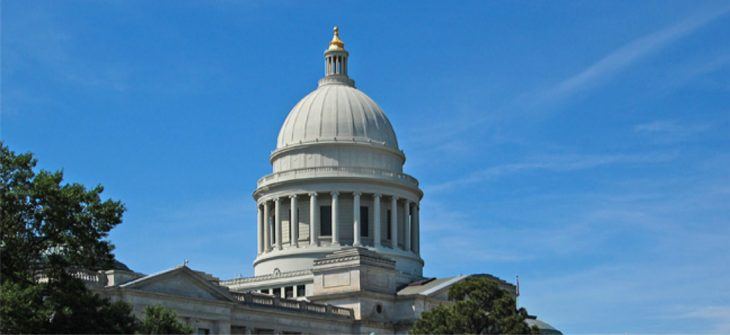Arkansas legislature adjourns after lawmakers adopt last-minute sanctuary city, open meetings bills
by April 10, 2019 3:22 pm 1,303 views

The 92nd General Assembly closed out the 2019 regular session on Wednesday (April 10) by sending a gaggle of last-minute bills to Gov. Asa Hutchinson’s desk, including proposals to record all public meetings, ban funding for so-called “sanctuary cities” and reorganize state government for the first time in 50 years.
In addition, both the House and Senate endorsed each other’s twin bills to fund the governor’s $5.75 billion budget and rainy day fund for the upcoming biennium. House Bill 1876 and Senate Bill 595, which were approved by votes 35-0 and 84-8, respectively, also allow lawmakers to transfer tax revenues into the treasury to fund the state’s fiscal 2020 budget, which begins July 1.
On the House side of the capitol, lawmakers approved Senate Bill 411 by Sen. Gary Stubblefield, R-Branch, banning Arkansas municipalities that adopt “sanctuary city” policies from receiving state funding. Sanctuary city laws across the U.S., which are opposed by President Donald Trump and many of his supporters, protect undocumented immigrants from deportation or prosecution.
Stubblefield’s bill was approved by the Senate late last week and emerged from the House City, County and Local Affairs Committee on Tuesday after a second try. The Arkansas Municipal League, which opposed the measure, noted in committee that no town or city in the state has ever adopted any sanctuary city policies.
Despite the state municipal league’s opposition and lukewarm support from Gov. Hutchinson over racial profiling concerns, SB 411 was approved by a vote of 69-22 on the House floor. Rep. Gary Deffenbaugh, R-Van Buren, argued on the house floor that the proposal would make Arkansas safer and prevent “undocumented illegal aliens” from suing state and local law enforcement officials.
“I am just asking you to vote for this because at least it will make our laws just a little bit stronger,” Deffenbaugh told his fellow representatives.
Gov. Hutchinson has not said if he will sign Stubblefield’s bill. Even without his signature or a veto, SB 411 will effectively become law and make Arkansas among the dozen or so states that have banned sanctuary cities, according to the National Conference of State Legislatures (NCSL).
At least 36 states and the District of Columbia considered legislation in 2017 regarding sanctuary jurisdictions or noncompliance with immigration detainers, according to NCSL data. Of these states, 33 states would prohibit sanctuary policies and 15 states and the D.C. support bans. Twelve states have legislation on both sides of the issue, while most states have introduced legislation.
Besides SB 411, House members also approved House Bill 1763, which will create the Transformation and Efficiencies Act of 2019. After the bill was approved by unanimous vote of 96-0, Gov. Hutchinson applauded the legislature for authorizing his administration to begin implementing the reduction of cabinet-level agencies from 42 to 15.
“Historic change is never easy, but these efforts to increase efficiencies and improve services in state government are long overdue,” Hutchinson said. “This is a great day that sets Arkansas on a course for an even greater future with a state government that is more efficient, a better steward of taxpayer dollars, and serves the people of Arkansas well.”
With the passage of his 2,047-page reorganization plan on the final day of the session, Hutchinson said he had achieved his Four T’s — tax cuts, transportation funding, teacher pay raises and transformation — in this year’s session.
“With the passage of this law, we have proven once again that Arkansas can lead nationally on any number of policy issues, from tax reform and education, to reforming the way state government operates,” Hutchinson said.
In the Senate, lawmakers also approved more than a dozen last-minute bills before adjourning after a brief morning session. After a failed attempt on the previous day, the Senate approved House Bill 1928 by Rep. Vivian Flowers, R-Pine Bluff, which would require all open public meetings in Arkansas to be recorded. It was approved by a vote of 19-3 after falling two short of the necessary 18 votes on Tuesday.
Approval of HB 1928 comes after Senate President Jim Hendren, R-Sulphur Springs, opened the door at the beginning of the session to allow the Senate to live-stream the chamber’s in-session business for the first time in history. In early February, the Arkansas Educational Television Network (AETN) announced it would begin live-streaming all state legislative proceedings, board and commission meetings and other hearings and official events, and then archive them for 30 days.
Among other bills, the Senate also approved HB 1619 by Rep. Grant Hodges, R-Rogers, which creates the state’s first Electric Motorized Scooter Act. The Senate also unanimously approved HB 1969 by Rep. Jeff Wardlaw, R-Hermitage, and co-sponsor Sen. Dave Wallace, R-Leachville, which would allow Arkansas to set a privately-run trust fund to collect contributions for the National Statuary Hall Collection in Washington, D.C.
Earlier in the session, lawmakers approved a bill to replace current statues at the national hall with busts of civil rights leader Daisy Bates and Arkansas rockabilly and country music icon Johnny Cash.
After Wednesday’s brief session on the Senate floor, Hendren thanked all 34 senators and Lt. Gov. Tim Griffin, who presides over the chamber, for their work since the session began on Jan. 14. He also invited the Senate staff to the floor, where the senators gave them a standing ovation.
Following Tuesday’s sine die, all 100 representatives and 35 senators will re-convene again at the state capitol on April 24 to consider any clean-up legislation, gubernatorial vetoes and other matters related to the 2019 session.
Separately, Gov. Hutchinson is expected to hold a signing ceremony for his transformation bill on the steps of the state capitol Thursday (April 11) at 2 p.m.
